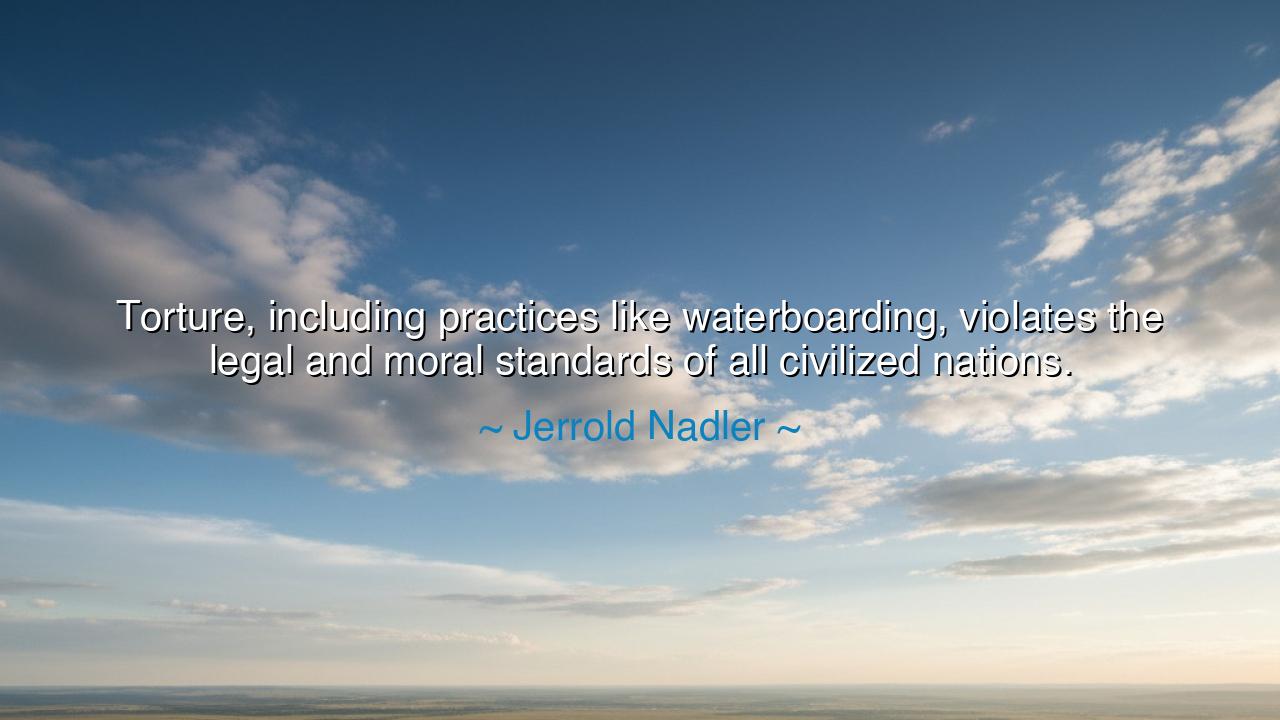
Torture, including practices like waterboarding, violates the
Torture, including practices like waterboarding, violates the legal and moral standards of all civilized nations.






Hearken, O seekers of justice, to the words of Jerrold Nadler, who declared with solemn clarity: “Torture, including practices like waterboarding, violates the legal and moral standards of all civilized nations.” In this utterance lies the cry of conscience that echoes across centuries—a call for humanity to remember that power without compassion is savagery, and security purchased through cruelty is a lie that poisons the soul of a nation.
Since the dawn of civilization, the struggle between law and violence has defined mankind’s moral ascent. In the ancient empires of Assyria and Rome, torture was wielded as an instrument of control—a tool to force truth through fear, to break bodies in pursuit of obedience. Yet even amid the darkness of those ages, philosophers and prophets rose to denounce it. The Stoics taught that virtue could not coexist with cruelty. The sages of every faith proclaimed that to degrade another being is to defile the divine spark within oneself. Thus, the idea of moral standards emerged—not as a luxury of peace, but as the very foundation of civilization.
Nadler’s words rise from this lineage of moral resistance. In the modern age, when nations wield unmatched power and technology, the temptation to justify torture in the name of safety remains ever-present. Yet the lesson of history is clear: when a society permits cruelty in its institutions, it begins to rot from within. During the Second World War, even in the face of unspeakable brutality, the Allies bound themselves to the Geneva Conventions, affirming that even enemies must be treated with dignity. It was not weakness but wisdom—an acknowledgment that the measure of civilization is not how it treats its friends, but how it treats its foes.
Consider the tale of the Spanish Inquisition, where torture was once sanctified as a path to purity. The Church, believing it defended truth, burned the innocent and mutilated the devout. But centuries later, history judged it not as a guardian of faith, but as a violator of humanity. In every age, those who justify torture in the name of righteousness awaken too late to their own corruption. The flame of fear consumes all who wield it.
Waterboarding, the practice Nadler names, is a symbol of this eternal moral test. It is a method designed to simulate drowning, to shatter the mind through terror. It has been defended as a means of protection, yet it destroys both the victim and the moral integrity of the torturer. No legal system, no nation that claims to be civilized, can condone such acts without betraying the very principles upon which its laws are built. The law must not be an instrument of domination—it must be the shield that guards human dignity.
From this truth emerges a lesson for all generations: strength is not proven through cruelty but through restraint. The legal standards that prohibit torture are not signs of weakness; they are the wisdom of centuries, paid for with the suffering of millions. When Nadler speaks of “civilized nations,” he reminds us that civilization itself is a fragile construct—maintained only when justice triumphs over vengeance, when compassion restrains fear.
O children of reason and mercy, let these words dwell in your hearts. Whenever anger tempts you to dehumanize another, remember that the line separating barbarism from civilization lies within the soul of every individual. The defense of human dignity is not the task of governments alone—it is the duty of all who believe in the sanctity of conscience. Speak against cruelty; demand justice that heals rather than harms. For a world that rejects torture not only preserves its laws, but preserves its humanity.
Thus let Nadler’s teaching stand as both warning and vow: when a people uphold moral standards even in the face of fear, they rise above the darkness that once enslaved them. But when they yield to cruelty in the name of necessity, they descend once more into the shadows from which civilization first emerged.






AAdministratorAdministrator
Welcome, honored guests. Please leave a comment, we will respond soon